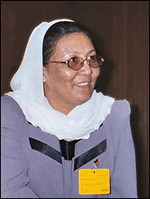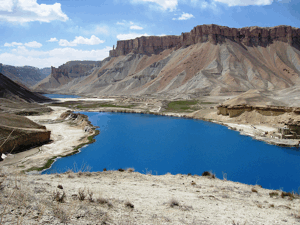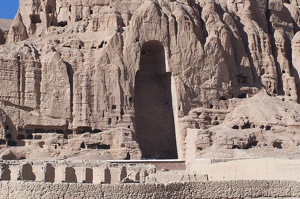Greening Afghanistan
Air Date: Week of October 29, 2010

Bamian Governor Habiba Sarabi wants her province to host ecotourists from all over the world. (Photo: USAID)
War might have kept the province of Bamiyan hidden for decades, but now Afghanistan's first and only woman governor has established the first national park there and is working to build its future on ecotourism. Living on Earth's Mitra Taj reports on Bamiyan Governor Habiba Sarabi's green ambitions for one of the poorest places in Afghanistan.
Transcript
GELLERMAN: National parks are peaceful places where people go to reflect on the beauty and wonderment of nature. The United States is blessed with 58 national parks, but Afghanistan, which sure can use the peace and tranquility, has only one. It was founded in a war zone on Earth Day 2009. Living on Earth’s Mitra Taj reports on the Band-e-Amir National Park and the woman who helped establish it.
TAJ: People who have traveled to Band-e-Amir describe their visits as “surreal.” A bumpy drive into the heart of a torn country, past abandoned tanks and valleys of un-cleared land mines. And in the middle of the desert, tucked into jagged mountains—a sudden blue beauty.
Six lakes, as bright as the sky above, spill water over twisting limestone formations. Band-e-Amir, in the province of Bamiyan, is Afghanistan’s first and only national park, and represents the vision of the country’s first and only woman governor: Habiba Sarabi.

Band-e-Amir National Park. (Photo: USAID)
SARABI: We have very beautiful lakes in Bamiyan, crystal blue lakes, supposed to be announced as a national park during the ‘60s, but unfortunately due to war and conflict in Afghanistan we were not able to do it.
TJA: Not until last year, when the park was finally announced. Sarabi is short and unassuming. She wears a light-colored headscarf and a gentle smile. She’s a hematologist, and during the Taliban years she lived with her children in Pakistan, secretly teaching Afghan girls.
While she was away, the Taliban destroyed Bamiyan’s famous stone Buddha statues, and the huge gaping holes where they once stood, now watch the road to Band-e-Amir National Park. Sarabi supports rebuilding the icons, and her efforts to revive the province recently earned her an invitation to Washington, DC to meet with other women conservationists.
AYLWARD: Governor Sarabi is an inspiration to everyone.
TAJ: Kelly Aylward works for the Wildlife Conservation Society and spent a week with Sarabi while she was here.

Where one of the stone buddhas once stood; the shadow of war still lingers over Bamian. (Photo: Carlos Ugarte)
AYLWARD: I think she saw the national park as a natural benefit for the people in her province and the potential for the long-term for the entire country. When I met her I was taken by her strong conviction and her fairly small voice.
TAJ: Governor Sarabi uses her small voice to sing the praises of the province she governs, and to try to turn its treasures into a foundation for growth.
SARABI: We should think about the sustainable economic development. So our vision is to promote ecotourism in this province, but ecotourism cannot be promoted without conservation. Ecotourism means that to respect the culture, to respect the nature, to respect the heritage and with that we have to bring responsible tourism in Bamiyan.
TAJ: Surprisingly, Sarabi’s province is safe for tourism: relatively calm and peaceful. Sarabi complains that other provinces, battlegrounds for Taliban and NATO control, attract most of the attention, and most of the development funds. So as the current war rages toward its 10th year, Sarabi is quietly working to build a future of one of the most underdeveloped places in the country.
FOLADI: Bamiyan is poor.
TAJ: Amir Foladi runs the Bamiyan Ecotourism Programme.
FOLADI: More than 85 percent of the income is through agriculture, but because of the harsh winter they cannot harvest two times a year, just once a year.
TAJ: Foladi says the same rugged environment that allows farmers to reap just one harvest a year can support tourism year round.
FOLADI: Bamiyan has a very rich cultural and natural heritage, like the Buddha niches, the caves with mural paintings, and the Ajar valley—the hunting place for the last king—Koh-i-Baba mountains, with lakes at the top of the mountains, and there is trekking for the summer, and skiing in the winter, and the local culture and traditions is also very attractive for tourists.

Bamian Governor Habiba Sarabi wants her province to host ecotourists from all over the world. (Photo: USAID)
TAJ: Foladi and his colleagues have already trained 20 tour guides to work at Band-e-Amir, and hope to hire many more. They’re also helping locals set up guest homes, and writing a guidebook for the area. Already one project—the Silk Road Festival in the summer—has turned into a success, drawing 7,000 tourists last year, a thousand more than the year before. Most were Afghans, and figuring out how to bring foreign tourists through the chaos of the rest of the country and into Bamiyan is still a challenge.
FOLADI: I hope in two to three years we will have better security in the country and good access to Bamiyan so we will have many tourists.
TAJ: But ecotourism isn’t the only potential answer to Bamiyan’s poverty. In June of this year the U.S. Geological Survey released a stunning report: Bamiyan is sitting on a trillion dollars worth of iron ore. Afghanistan’s Mining Minister is now considering bids from mining companies. Governor Sarabi welcomes all economic development, but prays it will be done carefully.
SARABI: This mine shouldn’t destroy the environment. The only concern for us is the environment.
TAJ: For Living on Earth, I’m Mitra Taj in Washington.
Links
The Wildlife Conservation Society's environmental work in Afghanistan.
Click here for more on tourism in Bamian.
Governor Sarabi met with other women conservationists with the Alliance for Global Conservation.
Living on Earth wants to hear from you!
Living on Earth
62 Calef Highway, Suite 212
Lee, NH 03861
Telephone: 617-287-4121
E-mail: comments@loe.org
Newsletter [Click here]
Donate to Living on Earth!
Living on Earth is an independent media program and relies entirely on contributions from listeners and institutions supporting public service. Please donate now to preserve an independent environmental voice.
NewsletterLiving on Earth offers a weekly delivery of the show's rundown to your mailbox. Sign up for our newsletter today!
 Sailors For The Sea: Be the change you want to sea.
Sailors For The Sea: Be the change you want to sea.
 The Grantham Foundation for the Protection of the Environment: Committed to protecting and improving the health of the global environment.
The Grantham Foundation for the Protection of the Environment: Committed to protecting and improving the health of the global environment.
 Contribute to Living on Earth and receive, as our gift to you, an archival print of one of Mark Seth Lender's extraordinary wildlife photographs. Follow the link to see Mark's current collection of photographs.
Contribute to Living on Earth and receive, as our gift to you, an archival print of one of Mark Seth Lender's extraordinary wildlife photographs. Follow the link to see Mark's current collection of photographs.
 Buy a signed copy of Mark Seth Lender's book Smeagull the Seagull & support Living on Earth
Buy a signed copy of Mark Seth Lender's book Smeagull the Seagull & support Living on Earth

